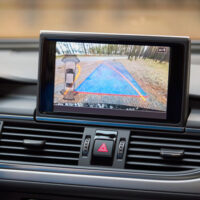Backup Cameras And Your Claim

A feature that has revolutionized vehicle safety, backup cameras reduce the risk of accidents, particularly in parking lots and driveways where visibility is often limited. These cameras were first introduced in 2002, and they were such a safety success they became a mandatory feature in new U.S. vehicles starting in May, 2018.
Although they have undoubtedly made driving safer, there are dangers when drivers rely too heavily on this technology. If you were injured in a collision and you believe a driver only looking at camera data was part of the problem, talk to a Baltimore personal injury lawyer about your damage recovery options.
The Role of Backup Cameras in Preventing Accidents
Backup cameras are designed to help drivers see the area directly behind their vehicle, a common blind spot when it comes to traditional rearview mirrors. They are particularly useful in avoiding what are referred to as backover accidents, which typically involve children, pedestrians, and objects that may not be visible without the assistance of a camera.
According to the National Highway Traffic Safety Administration (NHTSA), backover accidents cause thousands of injuries each year. By providing a clearer view, backup cameras help drivers reduce these incidents.
Yet despite numerous benefits, it’s essential to recognize that backup cameras are not a substitute for safe driving practices. Many drivers rely entirely on this safety feature, neglecting other essential defensive driving habits such as checking mirrors, looking over their shoulder, and being aware of their surroundings. This overreliance can lead to accidents, as backup cameras only cover a specific field of vision and may miss hazards that are outside the camera’s range or appear suddenly.
For instance, fast-moving pedestrians, cyclists, or vehicles approaching from the side may not be immediately visible in a backup camera’s view. If a driver is too dependent on the camera and doesn’t perform additional checks, they might miss these hazards, causing a collision.
Poor Driving Habits and Legal Accountability
In personal injury claims involving a driver who relied solely on a backup camera, legal professionals can examine the circumstances to determine whether the driver acted negligently. Even though backup cameras are a helpful tool, they are not a replacement for full situational awareness.
If someone is injured in a backup-related accident, the injured party may be entitled to compensation for their medical bills, lost wages, and other damages. A Baltimore personal injury lawyer can help assess whether the at-fault driver failed to exercise proper care and neglected critical safety behaviors.
While backup cameras are a well-recognized safety tool, they are not infallible. Drivers must remain vigilant and responsible behind the wheel. When they aren’t and accidents happen, victims have the right to hold them accountable.
How are you coping after a driver struck you while backing up their vehicle? In order to be sure you are not agreeing to an unfair settlement, bring your case to the attention of a seasoned attorney. Have a conversation with the attorneys at Iamele & Iamele, LLP as soon as possible. Contact us to book a confidential appointment.

